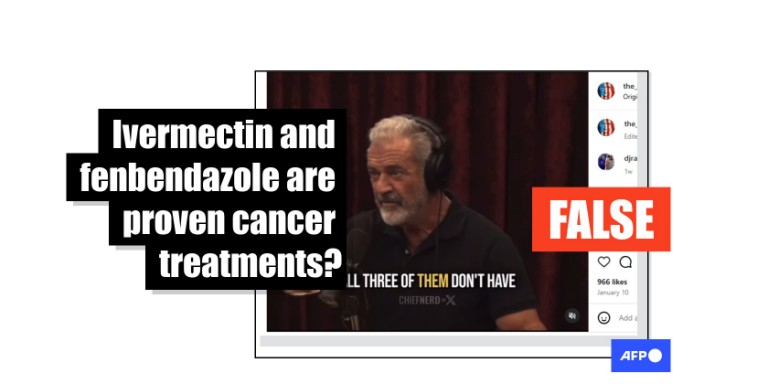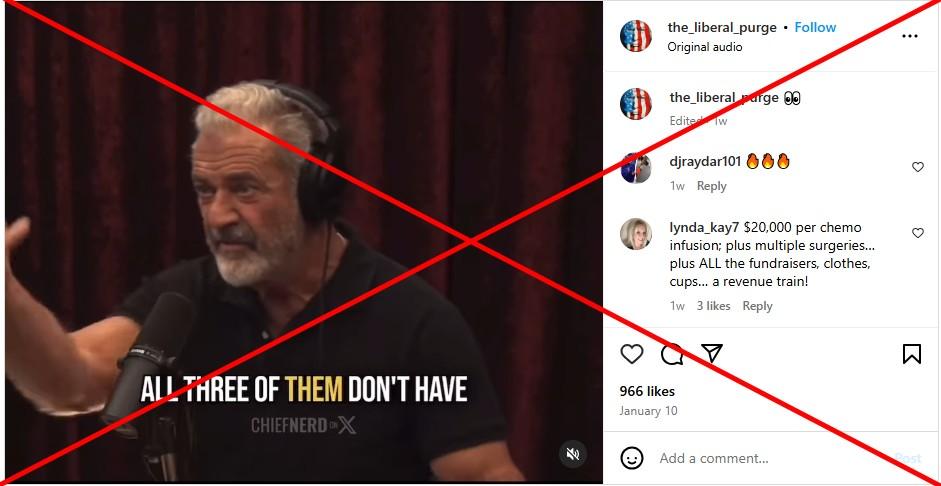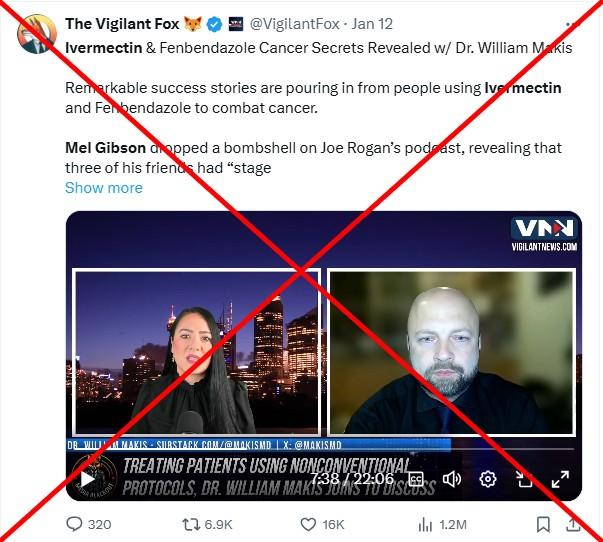
Mel Gibson comments on podcast fuel unsupported cancer cure claims
- This article is more than one year old.
- Published on January 21, 2025 at 22:30
- 4 min read
- By Sofia BARRAGAN, AFP Argentina
- Translation and adaptation Gwen Roley, AFP Canada
"Remarkable success stories are pouring in from people using Ivermectin and Fenbendazole to combat cancer," claims the caption of a January 12 video posted on X by "The Vigilant Fox" account, which has previously spread misinformation.
In the clip, Alberta physician William Makis -- who AFP has repeatedly fact-checked -- discusses the supposed benefits of the two products after Gibson claimed on Rogan's extremely popular program that three of his friends had overcome stage four cancer after taking ivermectin and fenbendazole, along with other substances.
The January 9 episode of the podcast -- where unsupported health claims have previously spread -- received more than 8 million views, while posts focused on the cancer cure claims spread across Facebook, X, Instagram and TikTok in English, French, Spanish and German.


AFP has previously debunked claims about the efficacy of ivermectin and fenbendazole in treating cancer. The posts propagating the claims from Gibson are similarly misleading.
Following the virality of the actor's appearance, the Canadian Cancer Society posted on X saying the treatments promoted by Gibson were "not scientifically proven" and run the risk of the cancer "spreading or getting worse" (archived here).
"The drugs mentioned in the podcast are being studied, but more research is needed to determine their effectiveness and safety before they can be prescribed for people with cancer," said Elizabeth Holmes, the director of health policy at the Canadian Cancer Society, in a January 20 email to AFP.
Ivermectin
Ivermectin is an antiparasitic drug often used in animals (archived here). In humans, the drug is approved for the treatment of infections caused by some parasitic worms and lice, as well as skin conditions (archived here).
The product has been the subject of several false claims, sometimes presented as a "miracle cure," particularly against Covid-19.
Some studies have suggested ivermectin has potential to treat cancer (archived here) and researchers have recruited patients for trials investigating whether the combination of ivermectin with other therapies can effectively treat aggressive breast cancers (archived here).
This ongoing research is only testing ivermectin in combination with other drugs, not in isolation.
Matías Norte from the oncological surgery division of the Hospital de Clínicas in Buenos Aires (archived here) told AFP there is so far no scientific evidence to support ivermectin's effectiveness as a treatment for cancer.
"We think it could reach the level of glycolysis, that is, it would prevent glucose from entering the cancer cell, but it would not cause the death of the cancer cell in any way," he said in a January 13 WhatsApp message.
The US Food and Drug Administration also warns an overdose of ivermectin can cause "nausea, vomiting, diarrhea, hypotension (low blood pressure), allergic reactions (itching and hives), dizziness, ataxia (problems with balance), seizures, coma and even death" (archived here).
Fenbendazole
Fenbendazole is an anthelmintic also used to treat parasites in animals (archived here).
Some anecdotal cases have sparked claims that the product can treat cancer in humans but Norte noted that medicine "cannot be generalized based on one, two or three cases, it must have a statistically representative sample."
Several studies have looked at the drug and others in the same class as potential cancer treatments (archived here and here), but have not found enough evidence to confirm they can cure cancer in humans.
"Seeing promising data in a dish of cancer cells is the beginning," said Sheila Singh, the director of the Centre for Discovery in Cancer Research at Canada's McMaster University (archived here), in 2023. "But to say that something could cure cancer is simply unscientific, because there's no data that backs up that claim whatsoever."
Singh previously explained to AFP that some of the mechanisms which drive parasites are also active in cancers cells, suggesting antiparasitics could be a possible cancer treatment -- but the path from preclinical evidence to a proven treatment can take up to 25 years.
Other treatment claims
In the widely viewed clip, Gibson also touts drinking hydrochloride and methylene blue as supposed cures for cancer.
It was not clear if Gibson misspoke and some posts mentioned hydrochloride as either a reference to chlorine dioxide or hydroxychloroquine as cancer treatments -- both used in misleading health claims previously debunked by AFP.
Methylene blue, or methylthioninium chloride, is a chemical compound primarily used to treat the blood disorder methemoglobinemia (archived here). It is also used in surgery as a skin stain and has antiseptic properties.
Outside of the medical field, methylene blue is used as a textile dye, as mentioned by Rogan, and in chemistry as a reaction indicator.
Norte of the Hospital de Clínicas said it was recently discovered that the compound could have benefits in treating glaucoma.
"But nothing more," he said. "In reality, it has more toxicity than benefits."
Clinical oncologist Victoria Costanzo (archived here) told AFP there is not scientific evidence to support the use of methylene blue, fenbendazole or ivermectin in the treatment of cancer, saying the claims were at the moment "experimental" or "fantasies."
"I would not recommend anyone, and even less so patients diagnosed with cancer, to take any of these drugs without the strict supervision of their doctor," she said in a WhatsApp message on January 14.
Read more of AFP's reporting on health misinformation here.
Copyright © AFP 2017-2026. Any commercial use of this content requires a subscription. Click here to find out more.
Is there content that you would like AFP to fact-check? Get in touch.
Contact us
